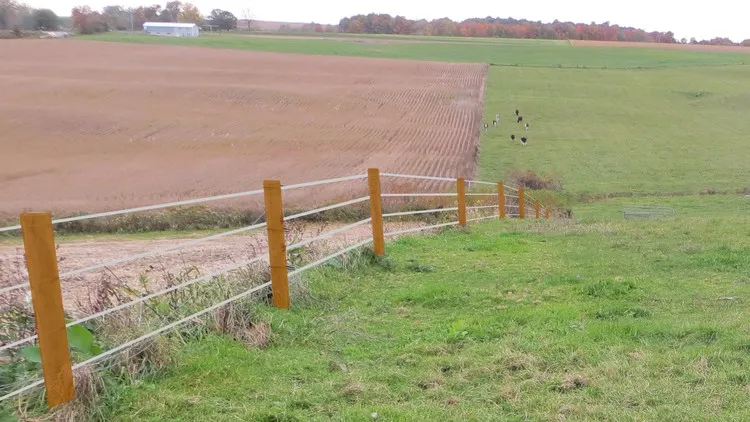
Agricultural Fence Design (NRCS Standard 382) 
This course provides an introduction to Agricultural Fence Design (NRCS Standard 382). Learn how to use fences to conserve soil and water, how to place them in strategic locations, and how to check for flaws in newly constructed fences. You will also learn how to write fence specifications for contract documents. This course is an online skill training course that will help you master the fundamentals of Agricultural Fence Design. ▼
ADVERTISEMENT
Course Feature
![]() Cost:
Cost:
Free
![]() Provider:
Provider:
Udemy
![]() Certificate:
Certificate:
No Information
![]() Language:
Language:
English
![]() Start Date:
Start Date:
Self Paced
Course Overview
❗The content presented here is sourced directly from Udemy platform. For comprehensive course details, including enrollment information, simply click on the 'Go to class' link on our website.
Updated in [May 25th, 2023]
Agricultural Fence Design (NRCS Standard 382) is a course designed to help learners understand the importance of fences in conserving soil and water. Learners will learn how to strategically place fences, how to check for flaws in newly constructed fences, and how to write fence specifications for contract documents. This course is ideal for those who are interested in learning more about agricultural fence design and how it can be used to protect soil and water resources. Additionally, learners will gain an understanding of the NRCS Standard 382, which is the national standard for agricultural fence design. This course will provide learners with the knowledge and skills necessary to design and construct fences that are both effective and efficient.
[Applications]
After completing this course, participants should be able to apply the principles of agricultural fence design to their own projects. They should be able to identify the best locations for fences, check for flaws in newly constructed fences, and write fence specifications for contract documents. Additionally, they should be able to use fences to conserve soil and water.
[Career Paths]
1. Agricultural Engineer: Agricultural engineers design and develop systems and equipment for agricultural production, processing, and storage. They also work to improve the efficiency of agricultural operations and to reduce environmental impacts. As the demand for sustainable agricultural practices increases, agricultural engineers will be in high demand to develop new technologies and systems to meet these needs.
2. Agricultural Consultant: Agricultural consultants provide advice and guidance to farmers and other agricultural professionals on a variety of topics, such as crop production, soil management, pest control, and farm management. As the agricultural industry continues to evolve, agricultural consultants will be needed to help farmers and other agricultural professionals stay up to date on the latest technologies and practices.
3. Agricultural Extension Agent: Agricultural extension agents provide educational services to farmers and other agricultural professionals. They provide information on the latest technologies and practices, as well as advice on how to best use them. As the agricultural industry continues to evolve, agricultural extension agents will be needed to help farmers and other agricultural professionals stay informed and up to date.
4. Agricultural Equipment Technician: Agricultural equipment technicians are responsible for maintaining and repairing agricultural equipment. As the demand for sustainable agricultural practices increases, agricultural equipment technicians will be in high demand to ensure that the equipment is functioning properly and efficiently.
[Education Paths]
1. Agricultural Engineering: Agricultural engineering is a field of study that focuses on the design and construction of agricultural structures and systems. This degree path provides students with the knowledge and skills to design and construct fences, irrigation systems, and other agricultural structures. Additionally, students learn about soil and water conservation, as well as the principles of sustainable agriculture. As the demand for sustainable agricultural practices increases, this degree path is becoming increasingly popular.
2. Environmental Science: Environmental science is a field of study that focuses on the interactions between humans and the environment. This degree path provides students with the knowledge and skills to understand the impacts of human activities on the environment, as well as the principles of sustainable development. Students learn about the effects of agricultural practices on the environment, and how to design and implement sustainable agricultural systems. As the demand for sustainable agricultural practices increases, this degree path is becoming increasingly popular.
3. Landscape Architecture: Landscape architecture is a field of study that focuses on the design and construction of outdoor spaces. This degree path provides students with the knowledge and skills to design and construct outdoor spaces, including agricultural fences. Additionally, students learn about the principles of sustainable design, as well as the effects of agricultural practices on the environment. As the demand for sustainable agricultural practices increases, this degree path is becoming increasingly popular.
4. Sustainable Agriculture: Sustainable agriculture is a field of study that focuses on the design and implementation of sustainable agricultural systems. This degree path provides students with the knowledge and skills to design and implement sustainable agricultural systems, including the use of fences. Additionally, students learn about soil and water conservation, as well as the principles of sustainable development. As the demand for sustainable agricultural practices increases, this degree path is becoming increasingly popular.
Pros & Cons

Covers important information.

Easy to understand.

Provides new ideas.

Includes references.

Does not review answers to examples.

Does not address gates.

Not applicable to all countries.
Course Provider

Provider Udemy's Stats at AZClass
Discussion and Reviews
0.0 (Based on 0 reviews)
Explore Similar Online Courses

Email Automations + Email Marketing Mastery with ConvertKit

Online Coaching Business: Health & Life Coach Certification

Python for Informatics: Exploring Information

Social Network Analysis

Introduction to Systematic Review and Meta-Analysis

The Analytics Edge

DCO042 - Python For Informatics

Causal Diagrams: Draw Your Assumptions Before Your Conclusions

Whole genome sequencing of bacterial genomes - tools and applications

Food Chemistry

Food Microbiology


Start your review of Agricultural Fence Design (NRCS Standard 382)